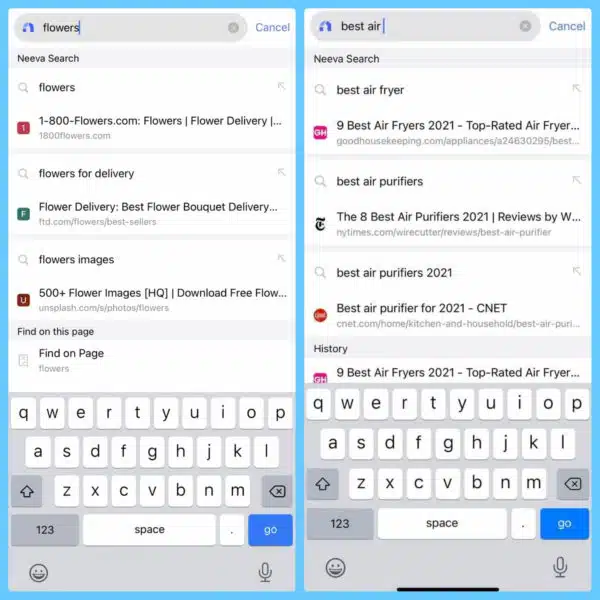Neeva’s ‘FastTap Search’ feature presents direct links instead of a results page
FastTap Search is a reimagining of the search results that’s only possible because Neeva doesn’t rely on ad revenue.
Neeva, the ad-free, private search engine is launching a feature that enables searchers to type queries directly into the URL field of their browser or the Neeva app to be shown a drop-down menu with direct links, the company announced Wednesday.

Named “FastTap Search,” the feature allows users to bypass traditional search engine results pages and head directly to a site via the list of links generated based on the query.
What is Neeva? Announced in June 2020 and officially launched about a year later, Neeva was founded by Sridhar Ramaswamy, former SVP of ads at Google. Unlike public search engines (Google, Bing, DuckDuckGo, etc.) that generate revenue by showing ads to users, Neeva operates under a subscription model in which users pay $4.95 per month. In exchange, Neeva provides an ad-free, customizable search experience.
RELATED: What would it take for new search engines to succeed?
FastTap is made possible by Neeva’s unique business model. “A feature like FastTap Search cannot co-exist with a search platform that relies on advertising revenue,” Ramaswamy said in the announcement.
This is because most search engines rely on advertising for revenue: Keeping users on the results page — for example, by adding search features that make it unnecessary to click on a result to find the desired information — typically means that search engines can show more ads and, in turn, bring in more ad revenue.
Since Neeva doesn’t show ads and users directly support the search engine, Neeva is free to create features like this without hurting its bottom line.
Why we care. This feature may take on more significance if Neeva is able to increase its share of the search market or if Neeva is popular with your particular audience. While this is a reimagining of the search results page, it is still a list of results and there is still a top position, which means algorithms have to determine relevance and award that position to a page, just as they do on other search engines. However, since FastTap Search only presents a few results, the brands or publishers that are able to earn that top spot stand to gain significant visibility, which can be important if you operate in a highly competitive sector.
As it stands, this feature is unlikely to impact our workflows or challenge the leading search engines in a meaningful way. But, FastTap Search does represent a new, simplified take on how users can search and how results can be presented. Google has attempted something similar with the “I’m Feeling Lucky” button that takes users directly to the top result for their query, however, the company’s strategy now seems to be on the opposite end of the spectrum. Its MUM-related announcements from Search On in September gave us a preview of search results pages that lead to even more search results, with featured snippets that may resolve queries without users having to click through. If the two search engines were similar in market share, we might get to see whether users prefer a simplified experience, like the one offered by Neeva’s FastTap, or a more robust search results page, which is the way Google appears to be headed.
Contributing authors are invited to create content for Search Engine Land and are chosen for their expertise and contribution to the search community. Our contributors work under the oversight of the editorial staff and contributions are checked for quality and relevance to our readers. Search Engine Land is owned by Semrush. Contributor was not asked to make any direct or indirect mentions of Semrush. The opinions they express are their own.


